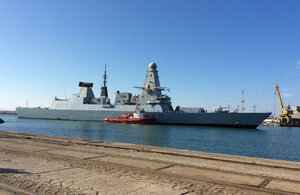British ship HMS Duncan visits Burgas
The visit on 12 November to 14 November 2015 underlines the ongoing cooperation between the UK and Bulgaria as NATO Allies.

HMS Duncan arrived in Bulgaria on 12 November
HMS Duncan of the Royal Navy is one of the newest and most advanced British warships ever built, fulfilling a range of roles but primarily air defence. The ship can track an object the size of a tennis ball, while the Sea Viper missiles, travelling at over 3000 miles per hour, are effective against all aerial threats out to 70 miles. In Bulgaria, the warship takes part in a training exercise with a Bulgarian Navy minesweeper on 14 November. The visit also demonstrates the strong bi-lateral cooperation with Bulgaria and builds on last year’s UK contribution of troops to two military exercises in Bulgaria. It also complements the UK support for the Sofia-based NATO Force Integration Unit, as well as its plans to provide troops to exercises again in 2016.
In addition to the naval exercise which HMS Duncan conducts with the Bulgarian Navy, the visit shows the broader, social dimensions of the UK-Bulgarian bi-lateral partnership. On the second day of their stay, the crew members welcomed children from Burgas. The children had the chance to tour the ship and were treated to snacks on board. On the same day, the British crew members also took the opportunity to meet with their Bulgarian Navy counterparts away from the operational environment in a friendly football match.
On the first night of the visit, Commander Rich Atkinson, Commanding Officer of HMS Duncan, and Ambassador Emma Hopkins OBE, co-hosted a Reception and Capability Demonstration on board the ship. The event was attended by Defence Minister Nikolay Nenchev, Bulgarian Chief of Defence Vice Admiral Rumen Nikolov, and the Chief of the Bulgarian Navy Rear Admiral Mitko Petev. Prior to the reception, Commander Atkinson also met with the Burgas Regional Governor Valcho Cholakov, Burgas Deputy Mayor Krasimir Stoychev, and the Burgas Naval Base Commander Commodore Malen Chubenkov.
Ambassador Emma Hopkins OBE said:
We remain committed to maintaining the collective security we enjoy through NATO and look forward to continuing to work with Bulgaria on the many security challenges we face together as NATO Allies and EU partners.
I am happy to welcome one of UK’s most modern Royal Navy Ships to Burgas. Visits like this not only provide the opportunity for our Navies to work together but also give crew members the chance to get to know their counterparts from the Bulgarian Navy better and to enjoy events such as the football match played between teams from HMS Duncan and the Burgas Naval Base.
Our modern Navy is also committed to playing an active role in the life of our communities. I am extremely pleased that children from Burgas had the unique opportunity to break away from their daily routines and explore the marvels of HMS Duncan.
Defence Attaché Captain Richard Blackwell RN commented:
This visit is part of the NATO Assurance Measures agreed at the Wales Summit 2014, and demonstrates the continuing UK commitment to the security and stability of the Black Sea region. Exercises such as the one HMS Duncan and the Bulgarian Navy conduct together provide a great opportunity to improve our inter-operability, as well as to better understand each other’s procedures and capabilities. This is especially valuable in the context of the many security challenges we face today.
At this time of significant strategic competition and global challenges we require multi-national solutions. That means more training, force generating and operating in multi-national coalitions in pursuit of shared goals – especially in NATO, the cornerstone of our defence.
The UK continues to invest in the modernisation and development of its armed forces. Our Government’s commitment to provide 2% of GDP for Defence in the remaining decade clearly underlines our strong commitment to the NATO alliance. We encourage other NATO partners to strive to achieve this percentage and recognise Bulgaria’s ongoing efforts in this area.